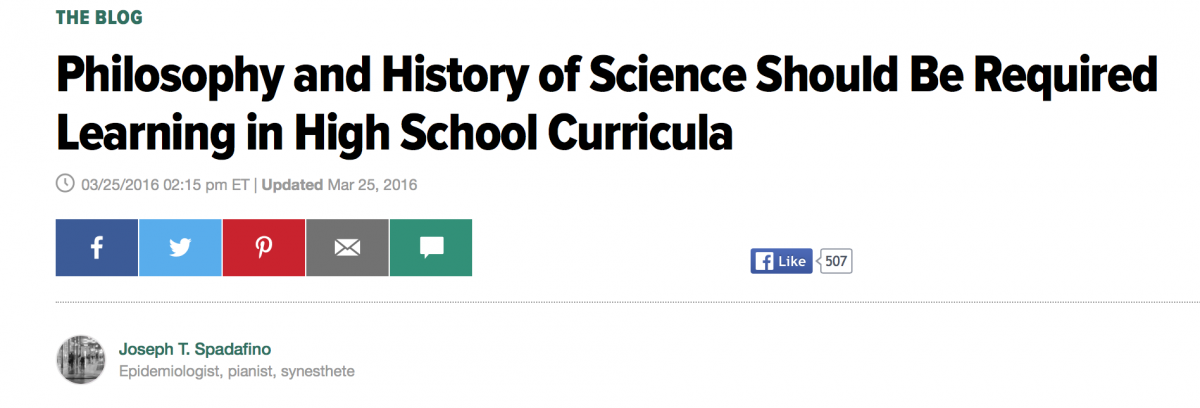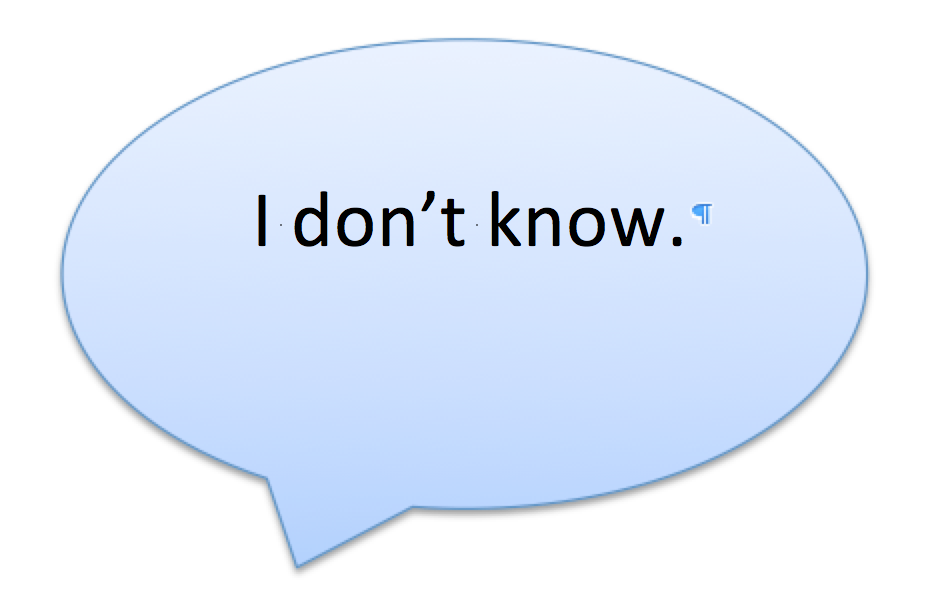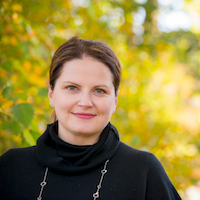As explained in part 1, we’re having a roundtable discussion of Joseph T. Spadafino’s “Americans’ Unwillingness to Accept Evolution En Masse Is a Failure of Science Education,” posted at (although later withdrawn from) the Huffington Post. Joining me are Ian Binns (elementary science educator and researcher), Amanda Glaze (scientist/science educator and NCSE guest blogger), Chris Lynn (associate professor of anthropology and director of the evolutionary studies minor at the University of Alabama), Caitlin Schrein (evolutionary anthropologist, science writer, and former teacher), and Adam Shapiro (author and historian of science). Take it away, Adam!
 Adam Shapiro: I think it’s important to recognize that Spadafino’s intention seems to be good. I don’t doubt that he is genuinely interested in promoting understanding of biological evolution. In one of his other HuffPo pieces, he justifies a call for more “Philosophy and History of Science” in K–12 schools by pointing to real problems (like epidemics exacerbated by anti-vaccinationism) that he thinks his prescription could address. Wanting to address those concerns is laudable, but as we’ve all noted, he just doesn’t seem to know what’s actually going on in the classroom. For example, curricula based on the Next Generation Science Standards does some of the things he proposes. And other aspects of his proposals seem not to understand how curricula is implemented at state and local levels.
Adam Shapiro: I think it’s important to recognize that Spadafino’s intention seems to be good. I don’t doubt that he is genuinely interested in promoting understanding of biological evolution. In one of his other HuffPo pieces, he justifies a call for more “Philosophy and History of Science” in K–12 schools by pointing to real problems (like epidemics exacerbated by anti-vaccinationism) that he thinks his prescription could address. Wanting to address those concerns is laudable, but as we’ve all noted, he just doesn’t seem to know what’s actually going on in the classroom. For example, curricula based on the Next Generation Science Standards does some of the things he proposes. And other aspects of his proposals seem not to understand how curricula is implemented at state and local levels.
Caitlin Schrein: I think my overall view of Spadafino’s piece was similar to Adam’s. I saw glimmers of the best intentions that the author had and think he was legitimately trying to say that teachers need to teach about evolution and teach it well. I would argue that's a fair and legitimate statement. Unfortunately, Spadafino’s logic and rhetoric don’t effectively convey this argument and some of the expectations he articulates are unreasonable.
Stephanie Keep: I agree with Amanda and Adam that Spadafino seems not really to understand what happens in a typical classroom. Nothing makes this point clearer than his suggestion that if only all teachers were prepared to discuss “endogenous retroviral elements” then we’d be all set. Really? That’d do it? I’m a) pretty sure that question has never come up in the history of teaching biology in K–12, and b) that even if it did, and the teacher knew the answer, it wouldn’t convince anyone that doesn’t already accept evolution to accept it.
Amanda Glaze: I have taught grades 7 through 12 and actually have taught students about endoviruses and the like just because they find it interesting. I can say from my personal experience it was not the magical key to unlocking acceptance of evolution.
SK: Way to make a liar out of me, Amanda!
CS: I found that section of the piece really odd (Amanda’s superstar teaching aside). Spadafino even seems to contradict his own argument later, when he writes, “evolution is a notoriously difficult concept to teach, even for the most knowledgeable teachers” (which is another point I agree with!). The fact is, the answers to the questions the author posed (and so many others in science) are complex, and no teacher (“enthusiastic and knowledgeable,” “passionate and brilliant” or not) should be made to feel bad for not being able to answer them. Rather, we should empower the educator by encouraging him or her to say to a student, “Here’s what I know and here’s what I don’t know, so let’s research the information we are missing together and try to find a suitable answer.” (Of course I recognize that’s hard to do when you have 40 students and little to no extra time for researching a topic.)
 Ian Binns: Yes, teaching teachers how to say, “I don’t know” is very hard. Society expects teachers to know everything, and new teachers especially can be scared to say that they don’t know. I tell my preservice teachers that it’s better to say, “I don't know” than to make something up.
Ian Binns: Yes, teaching teachers how to say, “I don’t know” is very hard. Society expects teachers to know everything, and new teachers especially can be scared to say that they don’t know. I tell my preservice teachers that it’s better to say, “I don't know” than to make something up.
CS: Yes, answers that are obviously “bad” can make students skeptical (this was something I learned in my doctoral research while interviewing students), so Spadafino is not totally wrong when he argues that point. But the solution to this problem is not to slap the teacher on the wrist (as I feel this author is doing). A better solution is to empower the teacher to give a better answer (which might just be “I don’t know”) and to empower the student to ask more questions when an answer doesn’t seem “right.”
Along these same lines, I think it’s unrealistic for anyone to set up a scenario in which a student “asks for evidence of evolution” and the teacher is supposed to dive into “genetics in the context of phylogeny,” as Spadafino does. That is not how classroom interactions between teachers and students typically happen, in my experience. A more realistic scenario, is a student asking (as a student just asked me last week), “If we came from apes, why are there still apes?” Answering this type of question can be difficult, especially if a teacher is caught off guard. But it’s important that teachers recognize the importance of such questions—this student is demonstrating a widespread misconception about evolution. We need to emphasize that teachers’ comfort with teaching the content is often related to the tools/resources they can access to help them understand and teach the material.
SK: Resources like all of us! Hey everybody, you can always contact us!
CS: Right! Teachers are not going to come out of an undergrad biology curriculum with a complete understanding of the theory and mechanisms of evolution. They need to have access to support.
Coming up in part 3: Amanda Glaze explains why piling on facts doesn’t help, and Chris Lynn talks about the “how” versus the “why.”
Are you a teacher and want to tell us about an amazing free resource? Do you have an idea for a Misconception Monday or other type of post? Have a fossil to share? See some good or bad examples of science communication lately? Drop me an email or shoot me a Tweet @keeps3.

